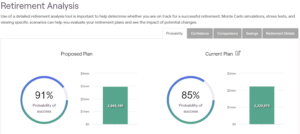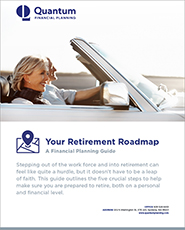If you’ve saved diligently into your company 401k plan over the course of your career and are wondering if it’s time to make the jump to retirement, this is a good time to consider working with a financial advisor. Finding the right financial planner for your personal situation is a critical decision that can impact the trajectory of your financial future. As a result, many soon-to-be retirees choose to interview a handful of financial advisors as they prepare to partner up in making some of the biggest financial decisions of their lifetime.
5 Questions to Ask Your Financial Advisor
Here are the top five questions to ask your financial advisor when choosing one for your specific needs:
1. Does the financial advisor work with clients like you?
It’s important to find a financial advisor who has experience working with clients in a similar financial situation to your own. Whether you’re an individual, a family, or a business owner, make sure the advisor has a track record of helping people like you achieve their financial goals.
Financial advisors who use their expertise working with a specific type of client are able to build a deep understanding of the topics that are most relevant to that specific person.
Let’s consider the financial plan of an Avista Utilities executive looking to transition to retirement. Here are some questions a financial planner with experience working with Avista employees will be able to answer in-depth:
- What is the best way to handle my pension benefits? Does a lump sum make sense?
- Is there any benefit in staying in my company 401k plan until I turn 59 ½?
- How will my Avista medical benefits impact my retirement?
- When should I take my social security benefits, given my Avista pension availability?
And the list goes on.
You will notice, while this advisor might be the perfect fit for an Avista retiree, they may not be the best advisor for an individual who owns their own small business as a real estate agent.
Real estate agents may be asking:
- Am I using the right small business retirement accounts to save for my future?
- How can I minimize my tax bill?
- My variable income makes me nervous at times, how can I build a net worth to stabilize this?
- How does the real estate that I have invested in over the course of my career factor into my financial plan?
While one advisor may be the best fit for one individual does not mean they are the best solution for everyone.
2. Does the financial advisor offer tax planning as part of their service?
Taxes can significantly impact not only your investment returns but also the probability of your overall financial success.
One of the greatest services a financial advisor can offer is tax planning.
Not only should they assist you in navigating the complexities of your various investment accounts, but a willingness to collaborate with your CPA will give you the best opportunity of minimizing your lifetime tax liability.
The number one way you can tell if a financial advisor actually does tax planning is by asking how often they will be reviewing your tax return.
If the answer is “every year”, you know you are in a good spot.
Some of the tax planning hurdles your financial advisor will help you assess are:
- Do Roth IRA conversions make sense for you? If so, when and how much?
- Will you be required to pay additional Medicare premiums in retirement due to your income level? How can you combat this?
- How much of your social security will be taxable, can you change this?
3. What can you expect from their team?
Your financial advisor should have a team of professionals supporting them to ensure you receive the best advice and service possible.
Ask about the size of their team, their roles, and how they will work with you to achieve your financial objectives.
Financial Planning Team Overview
Below are some of the roles your financial advisor should have at their disposal to provide you with comprehensive financial planning:
- Charter Financial Analyst (CFA): Many financial advisors have a CFA on their team who is responsible for building the investment models for the firm. CFAs have significant training in advanced investment analysis and are uniquely capable of building investment portfolios.
- Certified Public Accountant (CPA): Your financial advisor will be well-versed in tax planning but, having access to a licensed CPA to collaborate with allows them the ability to dive into the specifics of the tax code.
- Estate Planning Attorney: No financial plan is complete without an estate plan and the legal documents that accompany it. Having access to a good estate planning attorney that works with your financial advisor will ensure that your assets pass as you intended well after you are gone.
- Client Service Team: While most successful financial advisors spend most of their day working directly with clients on financial planning, what happens when you need something in-between strategy sessions? Client service associates are an essential piece of a financial team and are able to quickly answer your questions and escalate to your advisor when needed.
- Other financial advisors: One of the biggest advantages a financial advisor can have is the support of other financial advisors within their firm or peer group. While the advisor you are interviewing has a depth of experience, no one has seen it all. The ability for an advisor to access a second opinion of their peers is an advantage you should look for in a financial planning firm.
4. What qualifications does the financial advisor have?
Ensure that your financial advisor has the proper qualifications and credentials to provide you with sound financial advice.
You’ll want to ask about their education, experience, certifications, and licenses. Also, ask whether they have any disciplinary actions or complaints against them.
The gold standard in the financial planning world is the CFP® certification. This ensures that the financial advisor is equipped with the “4 E’s” of CFP® certification. Those are:
- Education – They have completed in-depth coursework in:
- General Financial Planning
- Risk Management
- Investment Planning
- Tax Planning
- Retirement Savings
- Estate Planning
- Financial Plan Development
- Exam – They have passed the 6-hour exam administered by the CFP® Board of Standards
- Experience – They have completed a minimum of 6,000 hours of professional experience relating to financial planning
- Ethics – The financial advisor has committed to act as a fiduciary. This means they act in the best interests of the client at all times when providing financial advice.
While working with a CFP® certainly does not guarantee you have found the right financial advisor for you, it can act as a preliminary screening checklist as you are assessing your options.
5. Tell me about how I can view my financial plan.
A good financial advisor will be transparent and provide you with a clear and comprehensive financial plan tailored to your unique needs and goals. Ask about how often you will receive updates on your plan. Also, ask how you can access information about your investments and progress toward your financial objectives.
Remember, a financial plan is a process, not an event. If your financial plan is made available to you in an Excel file, run. Not because the plan is incorrect or even bad advice, but rather because there are tools available that give you a much greater ability to access, update, and view your plan as life inevitably changes.

Many financial planners choose to meet with their clients on a quarterly, semiannual, or annual basis.
While there isn’t a right answer to the cadence you need to be meeting with your advisor, a good advisor will have a proven process that they follow to ensure you are receiving proactive comprehensive planning, not simply reacting as issues arise.
Remember, choosing a financial advisor is a significant decision that requires careful consideration. Don’t hesitate to ask tough questions to ensure you’re making the right choice.
At the end of the day, you want to feel confident that you’re working with an advisor who has your best interests in mind and has the unique skills required to help you achieve your financial goals.



